|
5 videos available for this event!
|
Theoretical Computer Science Spring School: Machine Learning
École de Printemps d’Informatique Théorique : Apprentissage Automatique (EPIT)
23 – 27 May 2022
|
Scientific Committee
Comité scientifique Florence d’Alché-Buc (Télécom Paris) Organizing Committee
Comité d’organisation Olivier Cappé (CNRS, ENS Paris) |
|
At the heart of ”artificial intelligence”, Machine Learning is a very active, interdisciplinary research field involving various concepts of theoretical computer science and mathematics. The 2022 EPIT on Machine Learning aims at presenting modern and promising aspects of Machine Learning to interested, but possibly non-specialist young researchers. This includes in particular deep neural networks, a particular class of algorithms that has obtained unexpected and spectacular empirical successes which still need to be understood from a theoretical point of view; this requires statistics, approximation theory, functional analysis, statistical physics, etc.
The 2022 EPIT will be composed of five 6-hours lectures given by international specialists. They present a great variety, from very theoretical aspects to applications and theoretical answer to social expectations: an general introduction to Statistical Learning Theory by Shipra Agrawal, a course on Optimization and (Deep) Learning by Francis Bach, a tutorial on Learning and GraphTheory by Pierre Vandergheynst, a lecture on Privacy in Machine Learning by Rachel Cummings, and a modern presentation of Machine Learning in Natural Language Processing by François Yvon. This selection is also meant to build bridges with other topics and communities. Each participant will be invited to give a short presentation of her/his research. Each speaker will be encouraged to provide, in addition to her/his lectures, a selection of exercises that will be discussed collectively in the evening. |
Au cœur de l’intelligence artificielle, l’apprentissage machine est un domaine de rechercheinter disciplinaire très actif qui fait appel à divers concepts de l’informatique théorique et des mathématiques. L’EPIT 2022 vise à présenter les aspects modernes et prometteurs de l’apprentissage automatique à de jeunes chercheurs intéressés, mais potentiellement non spécialistes du sujet. En particulier, on trouvera au coeur de cette école l’étude des réseaux neuronaux profonds, une classe particulière d’algorithmes qui a obtenu des succès empiriques inattendus et spectaculaires nécessitant encore d’être compris d’un point de vue théorique ; cette compréhension, pour l’instant balbutiante, implique à la fois la statistique, la théorie de l’approximation, l’analyse fonctionnelle, la physique statistique, etc.
L’EPIT 2022 sera composé de cinq cours de 6 heures donnés par des spécialistes internationaux. Elles présentent une grande variété, allant des aspects très théoriques aux applications e passant par une réponse théorique à des attentes sociales : une introduction générale à la théorie de l’apprentissage statistique par Shipra Agrawal, un cours sur l’optimisation et l’apprentissage (profond) par Francis Bach, un tutoriel sur l’apprentissage et la théorie des graphes par Pierre Vandergheynst, une conférence sur la vie privée dans l’apprentissage automatique par Rachel Cummings, et une présentation moderne de l’apprentissage automatique dans le traitement du langage naturel par François Yvon. Cette sélection est également destinée à établir des ponts avec d’autres sujets et communautés.Chaque participant sera invité à faire une brève présentation de ses recherches. Chaque intervenant sera encouragé à fournir, en plus de ses conférences, une sélection d’exercices qui seront discutés collectivement en soirée. |
Shipra Agrawal (Columbia University) Multi-armed bandits and reinforcement learning
Francis Bach (INRIA Paris & ENS Paris) Optimization and (deep) Learning
Rachel Cummings (Columbia University) Privacy in Machine Learning
Pierre Vandergheynst (École Polytechnique Fédérale de Lausanne) Learning and Graph Theory
François Yvon (CNRS – Université Paris-Saclay) Machine Learning in Natural Language Processing







